The Louis Waldon Interview
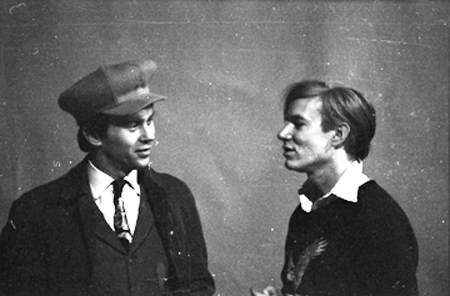
Louis and Andy, 1963

Louis 2007, interviewed on his boat in Marina del Rey.

Get the University Edition Book on Amazon HERE
How did you meet Andy?
Andy had seen me on Broadway in “The Ballad of the Sad Café”, and he came with Taylor Mead, a big superstar in the underground…he’d done ‘The Flower Thief’, an enormous hit.
(Andy) pursued me, wanted me to join the factory, they were starting to make movies. I was having a vacation out in Fire Island and I ran into Andy and he said “Oh, we’re making a movie; come on over and be in it.” So I went over one day, and first of all, it was windy and cold. This guy is sitting in a bathing suit, and they started to shoot, no script, nobody knew what to do.
Shooting on Fire Island
Andy looked like he was lost. He was with the camera and didn’t know what to do with everyone. I said, “Oh boy, I can’t work with these people, there’s no script.” I’ve never worked without a script, but I had always wanted to do improvisation. It excited me. Made me start thinking, improvisation? But what do I have to say? I didn’t know how to do it. Even though I was invited to. A few actors I knew said,
“You’d be great”. I just didn’t know how to approach improvisation.
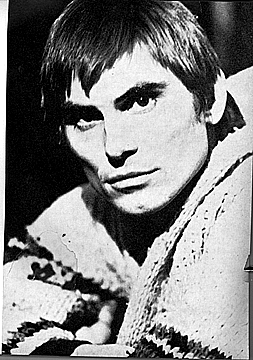
Allan Midgette
So, I finally decided one night. Alan Midgette, one of the actors, came over and said, “We’re shooting a movie right now, come on. He wants you to be in a movie.” I said, “I can’t be in a movie”. My neighbor came over and she painted a big design on my back for this new restaurant. So I went over and I saw a couple of other people and that was where I met Candy Darling. She didn’t know about Andy. But I was doing a reading and I’m only in half the movie because I had to leave at 9 o’clock to do this reading.
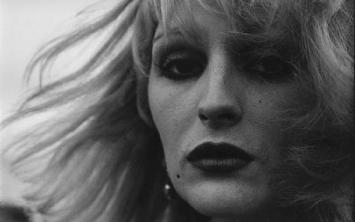
Candy Darling, not your average "girl"!
That’s how you met Candy Darling?
Candy was at the reading, so I took Candy to Max’s Kansa City to meet Andy, and she stopped me at the door and said, “Oh, I can’t go in there!”, and I said why not? She says, “Because it’s against the law for a man dressed as a woman to go into a New York bar, because of the Blue Law.” I said, “Well, baby this ain’t old New York, this is a New New York, nobody is going to arrest you. In fact you’re going to feel right at home”.
Sure enough she went in and all my Italian buddies that I was running around with were coming up and hitting on her. They were hitting on her! I said, “Later you guys. What the hell is wrong with you? You leave her alone”. They were talking to each other and not talking to me. They were like flies. I said, “Well, gotta get up and go see Andy. So I got up and they got down like that and were talking because she looked like a slut. She looked like a whore. She did her makeup and everything like that, and she didn’t have one good tooth in her mouth. They were all rotten. She’d smile and she would look like this really street kid. Then, she got it together with Andy and it worked out good. She was quite good.
You knew Viva then too?
Then called Susan Hoffman. I had met her before because a lady friend of hers wanted to introduce me to her because she wanted to be an actress. I told her what classes I was taking. She was weird. Only, I was very excited about it. She was very attractive. She was really weird looking. She sat that whole time talking and she was scratching her head. She had these scabs all over her head. She had just gotten out of an institution. She’ll get mad at me because she told me never to say this. I said it once and that’s it. It’s the only thing they put in the book. It’s what I said and she got mad. She started hanging out because she was hanging out with artists too. She was an artist by the way. She was a painter at that time. And she started hanging out with artists so she kind of moved in on the scene. That’s when she got invited up to do this movie with Andy. I don’t know but she was there when I got there. Viva was already established. She was doing different little movies...bits, you know.
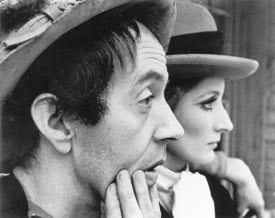
Taylor and Viva in "Lonesome Cowboys"
Can you tell me about “Lonesome Cowboys?
Right away we went out and did ‘Lonesome Cowboys’. That was a whole group of us. Flew out of New York. Flew to Tucson, Arizona. We stayed in a camp. Where city slickers go, a dude ranch. The University of Arizona had just inherited this dude ranch. It was in mint condition. It had Navaho rugs on the floor, little drawings on the walls. We took everything. When we left everybody dumped their clothes off and took the rugs into their bags. We all came back with rugs. Left our clothes there. It was like insane. We were pursued from the very first day of “Lonesome Cowboys”. The very first thing I said to Viva was, “Who the fuck do you think you are? What the fuck are you doing here? You don’t know that women aren’t allowed in this town?” We started cussing. It was the old Tucson; it was John Wayne’s town. They had tours coming through. When the tours heard us cussing and calling one another names, New Yorkers saying all this shit, they immediately went in and got us kicked out. We got kicked out. They kicked us out of the town. We had shot the entrance and a couple of scenes on the road and then we got out of there. It started raining anyway, it was horrible. Then we moved to the dude ranch and shot the rest at the dude ranch. That’s where the sheriff would come in on the hill and spy on us with his field glasses to see if we were raping women. That’s what the scene was. I was supposed to screw Viva. In the movie, nobody screwed her. Nobody wanted to. Everybody got up and left her. We’d be in a romantic scene with her and she’s seducing...come on, come on, and I’d say, “Excuse me; I have to go feed the chickens.” We had all said before, “Nobody screw her”. Andy wants this so bad. Nobody would touch her. We didn’t. We actually knocked her off her horse, threw her on the ground.
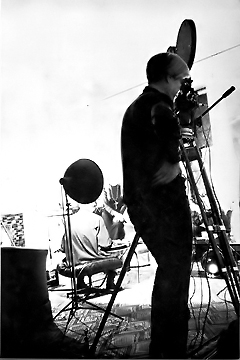
What about Andy?
Andy was a fan. Andy wanted to be an actor, Andy wanted to be in the movies, he wanted to be a famous person. He had a little wig, and it got better and better, and in fact, when he got shot it fell off. And they had to put it back on his head when they took him down the stairs into the ambulance.
When he was a fan he was a fan. Paul Morrissey wasn’t. Paul Morrissey was into taking over the Factory, take over the filming, which he finally did.
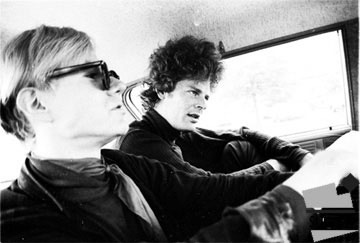
Paul and Andy discussing "business".
Why did everybody leave?
Everybody left because all the really older people left and Andy went into trans-sexuals and transvestites, and young people. He got rid of all us older people. We all left and went to Europe.
Tell me about Andy’s last movie.
I made Andy’s last movie…The one he shot, he organized it, and he shot it right after he got shot. He got out of the hospital and we made that movie. He got out in September and we made the movie in November. He just really wanted to be in the movies and he wanted to be a famous personality.

A quiet Factory evening.
People hated Andy?
But there was this dreaded thing that hung over Andy. People really hated him. They hated him because of Pop Art. Here were these people struggling in New York at that time, when Andy and the Pop Art scene came on. Before that everyone was struggling to make an Art movement. The last art movement was the abstract impressionism, Jackson Pollack and all those other guys. They had kind of reached a certain point, so there was a new movement that was going to go on. It was Pop Art.
They hated him. He got shot at several times, and he got shot, and he told me he died... He said, “I died, Louis... The light of the candle went out”. The pain, it was so painful he says, “And then the pain has stopped. I felt really good, and pretty soon I woke up, and I was back on again, they saved my life”. They got into him and operated on him. He had scars all over him. They saved him.

Valerie Solanis, Andy's last "shooter" appeared in his film, "I, a Man".
He was very menaced by a lot of people, threats. Crazy people. And the reason why he was was because he was working on an edge with people that were insane. They could talk and they could tell great stories. That part of it he got rid of. That was in the beginning. He was having all these crazy people, and he got rid of them, but he really had great actors in Ondine and Taylor Mead. They had created this movement. Taylor Mead was no editing, no script, nothing but what you have right there. If you wanted music he would put a radio on. This means you can sing to it. That was his idea. It’s the whole movement in Denmark today. A whole group of people who only make movies like that. No Hollywood bullshit. That was Taylor. And we brought Hollywood to its knees.

Jack Smith
I remember that great great artist.....Jack Smith had made a film called ‘Flaming Creatures, and that was such a cultured film that Hollywood producers came to look at it in New York, but they couldn’t understand what was going on. They had no idea. He had layered film over film, and he had three films running at once. They had no idea what it was, but it was very exotic. Jack Smith was another story. Jack Smith came to Italy after I had left the Factory and was in Italy. They brought him over to do a show. He was going in and he was a perfectionist. He went into a tailor’s shop to have this pair of pants made and when he got them back they didn’t work, and he got in a fight with the tailor. The tailor and he were on the floor rolling around, and the tailor grabbed his balls and squeezed them so hard he yelled and said “You almost killed me!” Just so crazy.

Jack Smith and Ivy Nicholson appear in Andy warhol's "Wives of Dracula"
What about Andy and Jack Smith?
Andy imitated Jack Smith. Andy’s way of delivery in conversation was Jack Smith’s way. And Jack Smith hated him.
Why do you think Andy wanted to imitate him?
Because it was such a perfect way. A lot of people talk like him today. “Oooh, weelll Gee...I dunno, gosh oh. Ok.” He was like that. (And that came from Jack Smith?”)
Yeah, Jack Smith was the original guy. Jack Smith didn’t talk either. Andy never talked. You couldn’t get two words out of Andy.
But Andy seemed to get everyone to do what he wanted them to do.
He went along. People already had THEIR minds made up about what they wanted to do. Andy just let them do it. He'd taped everybody and let them say whatever they wanted to say.
Fifteen minutes of Fame?
He never said “15 minutes of fame”. Someone said that one day, and I heard them say it. Andy just adopted everything. He adopted. He was a collector. He just adopted everything. He was good at it because nobody doubted him. No one questioned him. Because he was the one under fire. He was the one taking the shots. He was the one that people were shooting at.
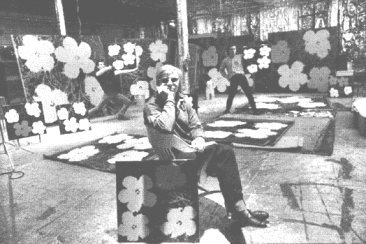
Andy and Flower Paintings
Let’s talk about the art.
Art was dead, we were making movies. We said it over and over, if Andy offers a painting take the hundred dollars.
These painting were only selling for two, three hundred dollars. Don’t take his art.
That’s what we would keep saying among all of us. And art was always dead. Trying to keep Andy away from art and making movies. That’s what we wanted, because that was a big movement going on. But they had a back room. He had several young kids from college come down. He was silk-screening. He was silk-screening over and over. They kind of put it on hold. Fred Hughes who handled his art became the sound man.

Andy and Portraits
Andy as a movie maker?
The only time he did a bad job was in “Blue Movie” when Viva and I were screwing in bed. He was underneath the bed and he kept dropping the sound ...holding the sound thing. I looked over one time and he had his head down like this and Paul Morrissey is going “Whhh, Weee”. Viva finally says, “Get Paul off the set, right now!” Because he was just screaming... they were all screaming. Andy was just like holding. Andy’s vision was into it. That camera was moving and it ended up on my knee. And it just stayed on my knee until my knee became my voice. It just got very very beautiful. They had a bit of a filter and the sun was setting. It was really bright in the apartment. Viva and I were there. We were working. It took us three for four hours to make that movie. We got it done and walked downstairs. Andy said, “Let’s go have lunch... or dinner. I’ll buy everybody dinner”. Ok, everybody’s happy about that. We go in and as we are approaching the bar, he turned and looked and he counters, “We can’t go in here”.
I said, "Why?” He said we don’t have enough women. They won’t let gay people come into this bar. I said, “Andy, that’s over with. Believe me their gonna let you in here. That’s for sure”.
Because he knew the owner, but Andy hid his homosexuality. He hid it for a long, long time. They were all afraid of it. It was not until probably in the 70’s that Andy started coming out. He used to hold hands under that table at Max’s Kansas City with his boyfriends, but he wouldn’t announce it. They were all nervous about it. Except Billy Name who wasn’t.
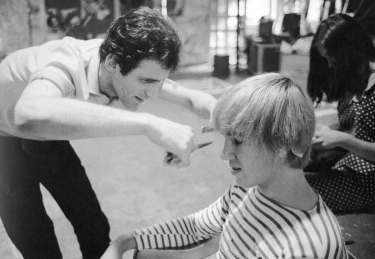
Billy cutting hair in the Silver Factory
What do you know about Billy Name?
Billy was on the scene in New York. He would come in and he’d stay at your place. Sleep there, hang out...... and he smoked Camel cigarettes. He would take the silver paper out of the pack of cigarettes and he would paste it on the wall. He would do a whole wall of silver. That’s where the Factory came from. He was doing a wall in there and Andy said can we do the whole Factory silver. So they got rolls and rolls of tin foil and did the whole building silver, which was pretty immense. It was like pretty big.
Billy was famous for that. He never wanted anything, never lived off you, and never did anything like that. He was always successful with himself.....going around.... always on the scene. I knew him before I really went up to the Factory. He was so happy when I would come up to the Factory. But, when I let, when I didn’t take over, and Paul took over he was a little angry. That’s when he had given up you know. The Factory kind of folded.
That happend when you and Viva were getting really good together?
I was getting better at it when we did “Blue movie”, the last movie... I was really getting good. And Viva and I were getting really good together...as a team. She is a tremendous comedian. She’s very very funny and she was beautiful then, and she was very funny. I enjoyed working with her. We had fun. But she was controlling, and she was undisciplined. She had no discipline, which was tragic. But once she got rolling she was great, as you will find out.
Tell me about Gerard Malanga.
Gerard was around on the scene. He was a poet. He was working with Andy. He was the one that helped him to silk-screen because Gerard worked in a clothing place where they were doing silk-screening....making material. He brought that work over too working with Andy. But Gerard was around and he was always with girls. He was always looking up the next starlet. We were always good friends. I had to protect him a couple of times from my tough Italian friends, who couldn’t stand him because he is Italian. And they couldn’t stand him because he was “mincy”. But he was great and he always had these beautiful girls. He owed this Italian friend of mine some money and I had to step in and tell the guy to forget about it. Don’t torture him. Leave him alone because he’s a good guy.
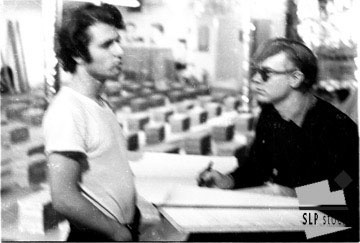
Gerard, the silk screening assistant.
Tell me some of the stories that you have about Gerard.
Gerard got kicked out of the Factory, and I really liked Gerard. Gerard went to Italy and he made this “Che Geuevra” (silk screen) and had a big show. They closed it down the night before the show opened and Gerard just got out of town and came right back. So Gerard was a little nervous and Andy didn’t want to have anything to do with him. Gerard came and talked to me one day and said that he would really like to come back to the Factory. I said, listen I’ll talk to Andy. The thing was, was that Gerard was doing this page, typed page of interviews, which turned into Interview Magazine. He and this other guy got together and they were coming to the Factory and typing. But then, he got discovered taking things out of the files. They kicked him out of the Factory. And this time I couldn’t get him back in. I went to Andy and Andy said, “No way. Please, just don’t even talk about that.”

Being just like Andy.
Everybody in the Factory wanted to be important some day...like Andy?
But you know something? There always was that question: “Everybody who started with Andy, except Billy Name, thought they were going to be just as important as Andy”.
Just as big as Andy. There was this tremendous assertion going on at that time because everything was changing. The whole anti-war thing was changing in New York. People from Madison Avenue were coming down and they met at Max’s Kansas City. This whole different thing was going. Peter Max and all these people and everybody were becoming famous. They didn’t want to be associated with Andy Warhol. The more Andy became famous, the more they withdrew. They thought they were going to be just as famous, have a little shot, and get a Hollywood movie.
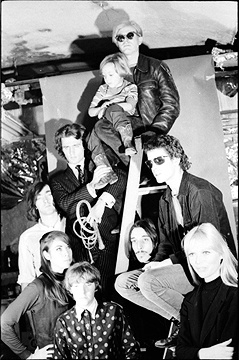
"Silver Family"
Do you think that Andy was.....a giver? or a taker?
If he liked you... If he thought you were going to help the Factory, yes. But if he didn’t he wouldn’t talk to you and you were out of the Factory. You couldn’t even get in the elevator. He was very secure about that, who we had working around and who we didn’t have. See, right after the movies came his art again, and then came Interview Magazine. He got that whole bunch of guys from Harvard down and he got this whole different office atmosphere. I became very professional .He kept his area. I had lunch with him a couple of times up there in the new factory.
Always a party...
Tell me about the parties...
I didn’t really hang out there, but when Andy called, I came. Andy called me one night, “Listen, we’re having a party. Tennessee Williams is coming”. I was always interested in Tennessee. I had met him before. I went back up to the Factory. It was a really cold Tuesday night, or something like that. When they started to come in, Judy Garland, Montgomery Cliff, Nurev, and Tennessee, all these people came in and that was when the twist was going on. They were like playing music and doing the twist. In fact, my buddy danced with Nurev. He said that was so great and Nurev, we were twisting together? Ya...Alan knows all about that.
Of course I remember that night. It was great. Everybody was dancing and laughing and talking. Poor Montgomery Clift was just about gone. He was a splot on the floor. He couldn’t stand up. No, he was gone. (How) Well, physically. He had diabetes really bad, losing his eyesight, losing his strength. I think he died not much longer after that. Alan knew him really well.

Salvador Dali, Gerard and Mary Woronov "party" at the Factory.

Factory Screening
What about the screenings at the Silver Factory?
Oh yeah, I went and saw “Suicide”. Andy didn’t know how to work the camera. He just got this new lens. He was supposed to go down....stop...focus it. And then you could use it all the time. He didn’t do it, so when he came in close the poor guy was out of focus. It was so dramatic because all it was was a guy sitting, kneeling on a box and he had a thing full of tomatoes and he was squashing them. On his hands and on his arms and he was talking about his suicide attempts. Heavy; But it was out of focus so he never showed it again after that.
What would happen at a screening?
Well, it was always very, very commercial. It was a screening, and then it was over with. There was no drinking, no party making. They would just all come in and see the movie and leave.
Andy was not respected. Andy was always doubted. But the people who did understand him and really did get into it and knew what was going on. That there was a change and that he was on top of it. They really loved it. They would give into to it. A buddy of mine said, “Lou, I just saw this movie with Ondine in it. It was just fabulous. It was great. This guy is a great actor!”

Ondine in "Chelsea Girls".
What character was Ondine?
He plays the Pope. He played this hierarchy in the Catholic Church, and he was brilliant. He had a great face. He looked like god. He had a beautiful face you know. In fact, I made a DVD for my show up there. It’s got a scene with me and Ondine in it. It’s really great. It’s from back in the sixties. He looked great. Ondine was funny. He was the best actor. He didn’t like women at all. He would attack them in the movies. He choked one. Just jumped over and RRRRRRRRR ...everyone’s screaming and yelling. Andy’s just shooting away. That’s one thing about Andy. He probably thought that was all part of the movie. Everything was improvised, right. It was just part of the movie, but anything could happen. He was so kind and sweet.
More Viva?
We were down there in Arizona about ready to come back to the airport, and we went to a bar. We all got drinks, and Viva sashayed up and ordered a drink. The (bartender) says, Do you have an ID? She says, “No I don’t”. I don’t have an ID, nasty. Well, I can’t serve you. Well, it turned into a big fight. Viva went down the street and got a cop and brought the cop up. And Andy says,”Oh Louis please talk to her. This is exhausting;” We’d been a week, a whole week together out in the desert and he was done in by her. So he says, please go down and get her.
Paul and Andy doing more "business".
What about Paul Morrissey, how did he change the Factory?
I can talk to you about it, but it changed. I remember it was Paul Morrissey making the change. Andy did not know how to work a camera. Paul was a filmmaker that, by the way, Gerard brought around. Paul got into it and Paul decided he was going to take over. And slowly (he) would push people away. He was rude. It didn’t bother me because I was a professional actor, but Ondine hated him and wouldn’t work for him. And he wouldn’t work when he was there. That was what was really breaking it up. Gerard had to get out because Paul Morrissey turned on him. Paul Morrissey ruined that whole Silver Factory at that time. He hated it. He wanted it to become like Hollywood. He was pushing the Factory to become more like Hollywood. Glamour and stuff like that. Where this was really, don’t forget, is where Andy first got shot at. One guy came with a gun and shot his paintings. Started shooting a gun around the Factory, and then left. It was getting kind of scary. It was a scary place. It wasn’t a delightful place. It was like Heavy! That’s when Lou Reed and all those guys were hanging out there. Then they all left. They decided to go out on their own. He had Nico. He had... (Marie ?)..No not Marie, she had already left. She left right away.(International Velevet? ).Velvet was there. She was a very lovely girl. He had a whole group that would come around. And of course he had UltraViolet and Viva. Then of course when Viva came in Andy concentrated on her.
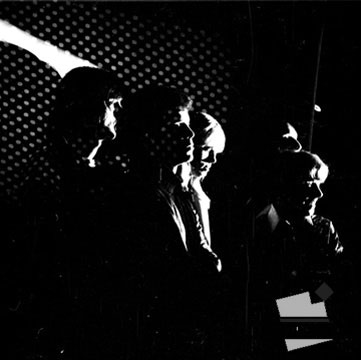
The Velvets at the DOM.
Don’t forget that most of those girls only lasted three or four months. They didn’t last very long in there. (Why?) There just wasn’t anything for them to do. Once Viva became the star, there was another comedian there that was very very funny. She was a prostitute. She was from New Jersey. She was very very funny. She was a German girl. I can’t tell you her name right now, but she was really a delight. But a lot of them, they had no drive. They didn’t know what they were doing. They were just out there.
.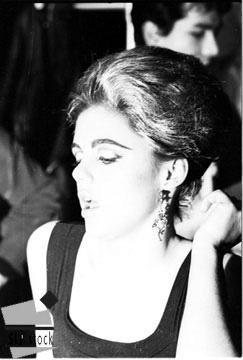
Edie, Silver Star!
Andy’s “star making” power?
The beautiful thing about Andy was you got instant recognition. If you did one thing for him on Monday, on Friday you were in the papers. And it was that fast.
They were on to him. That’s who made him really, the writers and the newspaper people. There was this fabulous party with 400 people......300 people... maybe there was really only twenty people there. It was all building it up. They loved him. They loved Andy. They made the news, and they started hanging out in the clubs and he kept it up. He was getting the publicity.
They liked Andy, but you said these other people hated Andy?
They were in competition with him. Well, when the scene was young, and everyone was vying to become somebody. They didn’t want that pop art; they didn’t want the shit he was doing. They were all into Godard, and European films. They weren’t into this immediate, what I called Pulp Fiction. I did call it at that time Pulp fiction. It was Pulp Life. It was extraordinary. And he had these great women, so it attracted a lot of men. Great women. He had what’s her name. I did my first play with her, and then I did my first movie with her called “Kitchen” or “Kiss”. I can’t remember which one it was. This was like ‘62. I always floated in and floated out.

Andy and Factory People.
Didn’t Ultra do a movie?
Well, she did that with John Chamberlain, the sculptor, who was making movies at the same time. Who came out when we were doing “Cowboys” and he made a movie alongside. John had made a movie with UltraViolet. He was in love with UltraViolet. She dumped him and it broke his heart. He would hate hearing that, but I remember I was with him when he made me call her because she wouldn’t accept any calls. But with me she would. She would ask me what’s going on. She didn’t get invited out to the Lonesome Cowboys movie. (Because John was there?) No, because Viva..... They didn’t have anything for her to do in the movie. It was again Paul Morrissey trying to control John and make it in the movies. We had no script we just came up with the idea of Romeo and Juliette, but it really was a Romeo and Juliette. One of the actors said that. He said, “I’m writing the script”. He’d write out here and he would call me Mickey. All kinds of things. But that movie just went its way. It was great because what it was the advanced times. Here there was this western town with these guys who are bisexual cowboys, but didn’t like prostitutes, and they didn’t like Viva. When she came to town they all ran her out of town. It’s really funny. It’s really hilarious when you think about it. People make this up. Here we are doing what they are doing today in movies. What Hollywood is doing today? We were doing it back then and we got clubbed for it. I couldn’t get a job in Hollywood. They just didn’t like the “No Scripts» Are you crazy? What are all the writers doing? The writers were furious at us. That whole idea of improvised movies. To bad it has disappeared because it was a great form. Too bad we lost all those good people that we had. And Andy and Paul took over and destroyed it. Well, I guess, he made it another way which didn’t last very long.
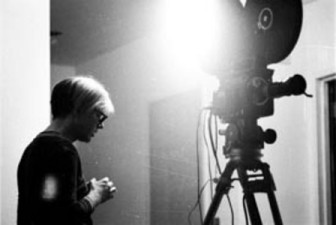
Time to make "Hollywood Movies".
So, it was Paul... did he do it intentionally?
Yes. He wanted to make Hollywood movies. He wanted to make movies with scripts and ideas and concepts, totally against what we were coming up with and what we were doing. And of course everybody said, “Fuck him....I’m not going to go hang out with him. I don’t want to come to the Factory if he’s around.” And they didn’t. And so they started bringing all these kids in. The younger people hanging out. It was just sort of dissipating. Andy went on his way with the magazine and that last movie “Bad”. His boyfriend made it. Jed Johnson. He made that movie. That was it.
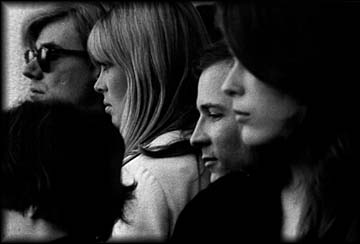
Mary Woronov with Nico and Andy in LA.
What about Mary?
I didn’t know Mary because Mary had gotten married and moved to Italy, and she was doing her thing and like most people she didn’t want to have anything to do with Andy.
Didn’t want to have anything to do with Andy?
Nobody wanted to be identified with Andy. They thought he was bad karma, and he didn’t pay. But if you were worth it, those people writing the magazines made a lot more money. Then Andy was becoming an actor, working in TV. He was starting his own career.
Vincent Fremont?
We picked up Vincent Fremont in San Diego when we were doing a San Diego movie. We picked up several of those people with that very pretty handsome kid that was in it. In “Lonesome Cowboys” we picked them up and brought them to New York. Vincent Fremont hung around the Factory and swept the floor. Just around. An errand boy, until everybody started dying, and then he took over. He took over. I mean he’s a millionaire. He’s another one. Here Viva and I have no money and all these guys are all really rich. Beyond belief rich. Because they stuck it out there. They got the paintings. They got the business. Because you could do business with Andy if he liked you. He didn’t care what you did. Besides, it was for the Factory you know, for him.
I love this idea you just brought in.... as long as it’s for the Factory?
He just did it. He didn’t pay you or he wouldn’t talk to you. If he thought you were betraying the Factory or betraying him he never had anything else to do with you. He never talked to Mary again. He never did, I don’t think. Since her mother sued Andy. Andy hated it when people sued him. The woman that did the flowers. You know that story? Andy got that picture off the cover of House and Garden magazine, the cover. When the woman found out that was her photograph, she went to Andy and took him to court and made him pay. I think she got 10,000 bucks or something like that. Andy had offered her three flower paintings.
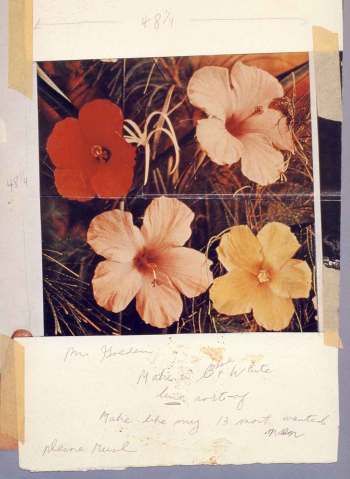
The Flower Painting story.
She called up one day and told Andy, “I’m going to give your money back. I’ll just take the three flower paintings.” He hung up on her. He said, “Can you imagine? She took me through court.” He hated lawyers and he hated court, but he had some good ones.

Talking business?
How did Andy talk business?
When you’d go to talk business with Andy, he really didn’t want to talk about it.
He would say, “Ohh, I can give you some money, but not very much. I can only give you a hundred dollars”. I said great! I thought that was perfect. You did a movie in two hours. At that time that was good pay. A hundred bucks. But among the actors... especially Brigitte... Viva and all they, they said, “Don’t accept anything from Andy. Don’t accept anything, except money because money really gets to him. Money really makes him nervous”.
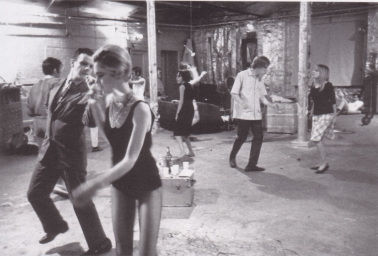
A good place to hang out and party!
But what they don’t understand is this. He had a big Factory. He paid the rent on it. You could go there and hang out all day if you were liked. And hang out while he was working. They had like a little club and it was really great. They had a lot of fun! Andy would come out and he would produce the movies. They cost 15 hundred to two thousand to three dollars at that time to produce an hour, two hour of film in color with sound. So, he paid for all that. I went because of the immediate publicity that you got. The notoriety was great. Here you were on the cover of magazines and the newspapers. Your name is mentioned all the time. It was a good move for an actor like me, who was working with off-Broadway which was a hundred years behind times. It was great to be in the immediate hot spot. Andy was there because he was unique himself.
How did Andy make himself unique?
He made himself more unique. The deeper he got in, the wilder his wigs got. As you go thru the ages you’d look at his wigs and see how wilder he’s getting to be. That as wild as you could get.
At that time we were saying that “Art is Dead”. Don’t accept any art, trying to get Andy to not do that art anymore and stick to the movies. There was a whole aggressive move going on with all the people working in the movies. Because they thought it was more immediate and you could get more attention .The movies were starting to get longer and get a lot more publicity, get a lot of promotion. Doing a lot and they wanted to keep Andy doing them.
But then unfortunately Paul Morrissey took over. We were doing “Surf’s Up”.
Paul Morrissey comes out on the beach with a camera. And Viva and Taylor and all of them said, “We’re not working. If he turns one piece of film, we’re leaving. We’re not working for Paul. We’re only letting Andy do it.” Because they only believed in Andy. Andy had the philosophy and the feelings about it. He had good feeling, a good sense and a good eye.
More quiet time, please.
Why did he let Paul do it?
That’s the way the Factory was structured. Anybody, if they had the power and the energy and the intelligence to take over that scene, they could take it over. And Andy wasn’t going to be able to make movies anymore because he didn’t have anyone to help him make a movie. I think he kind of lost his speed when he got shot.
But before this there was almost a revolt against Paul?
Well, it was subtle. Paul had Joe Dellassandro. He found Joe and they were going that way. He got the transsexuals and the drag queens working. They were all dying to work. They all loved Andy.

The Drag Queens like Holly were helping to make Paul (and Andy) a success.
It was making publicity and it was promoting itself. As long as it promoted itself in the Factory it could live. It’s fine, because it started out with painting, with art, went to movies, went to that magazine, publicity, went to back to his art again.... doing a lot of art, and then he started hanging out in clubs, and then his personality started to come out. He became a personality person. He got to know everybody, he got to meet everybody. Andy went to Iran to the Iran’s king’s big party at the time that everybody was saying you don’t. That’s politically incorrect. You don’t go there. You don’t support those guys who we are trying to get rid of. Andy went. Everyone went....Ohhhhhhhh... terrible Warhol....especially in Italy.
Do you think Andy was political?
No, Andy didn’t like politics. Andy decided that maybe McCarthy was a good way to go. But basically he knew nothing about politics, wasn’t into it at all. He didn’t say it, but everybody in the Factory hated hippies. They just hated hippies. Poor Alan Midgette got the brunt of that because he was a hippie, a stone-hippy. He was into that free love and the whole hippy thing. That’s boring, they kept saying. Especially Andy, “That’s boring”. Hippy? That’s not exciting.
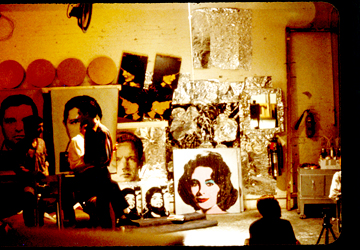
Jackie paintings were about as political as Andy ever got!
Fascinating that this period of the sixties....so many amazing things happened in America. ........The President’s assassination....Martin Luther King.....and then there’s Andy…
The reason why, is that Politics dates the project. In other words, if you mention that, that’s that time, that day, that date. They were trying to make their movies everlasting. They wanted them to belonging to no period, to make them completely integral. They did talk a little bit. A couple of people talked about the Vietnam war, they wouldn’t push it at all or bring it up, but the pressure was so great we had to say something, it just couldn’t be these people.
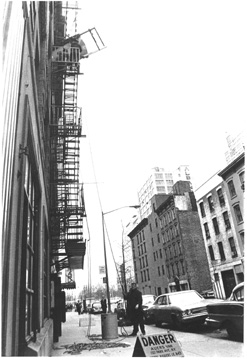
Moving things out of the old Silver Factory, 1968.
What happened to the Silver Factory?
The thing with the Silver factory, it died, just after the last shooting. Then they moved out of there and they moved down to 14th street. Down to the park there, into that factory. Because there were so many people. It was an old building. I think maybe he lost the lease. They had to move so they got out of there. It was a whole dark heavy period… That’s just when drugs were coming up, when speed was coming up, so a lot of people were experimenting with LSD and everything. That was all happening at that time. So, it got very dark in there. Andy wanted to do something else. When we shot “Lonesome Cowboys” out there, that’s when they moved. That’s when Andy got shot by Valerie Solonas.
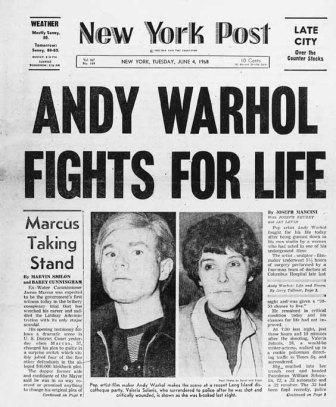
The end of the Silver Factory Era.
Were you in New York when Andy got shot by Valerie Solanis?
I was sitting home and it came on the radio. I lived about two blocks away, and I ran over there, and they were bringing Andy downstairs. His wig was hanging off the side of his head. I wanted to put it back on his head because I didn’t want anyone to take a picture of Andy without his wig. Everyone was in shock. We all went to the hospital, and we were all sitting around there. You should have seen the creeps who came drifting in. There was one girl who said if Andy didn’t die, she was going to finish him; they had to call the cops and get her out of there. Andy’s mother came and it was really sad. She made me go with what’s her name, she’s a model. She’s nuts. (Ivy Nicholson) ……and Ivy was gonna jump the moment Andy died, and I was supposed to watch her. I wanted to screw her, but so I had to go and sit with her. But she was sweet. She was really Holly go lightly...this hillbilly chick who made it big in modeling. She went to France and did well. She’s in Montana someplace now. She called me.

Another "late night" ending at Bickford's.
Why did somebody shoot Andy?
When I was interviewed for the radio, they asked, Why did this happen. I said,
Because Andy lived on the edge. Andy’s people most of them are insane and he’s living right there among them. He’s totally open to them. When what’s her name shot Andy (Valerie) she came up to the Factory. Andy had no idea she was going to shoot him. In fact, I think he said, “Oh no, oh Valery, no, please!”, when she had the gun on him. She had pointed it at everybody. She had Fred Hughes on his knees begging for his life. Paul Morrissey ran into the screening room and closed the door and she put the gun up against the window and was going to shoot Paul through the window. She went through the whole factory. Fred lived because the door opened as she was going to shoot Fred and it clicked and she ran, jumped into the elevator and went down. But she had shot two people. She shot Andy and we all went to the hospital. He took a long time recovering. It was pretty dramatic. It was like that. It was beginning to be like that. It was getting crazy.
Nico took her 15 minuts of fame and ran with it!
It started with the art and maybe there was too much happening?
Well, there was a lot of energy…absolutely a lot of energy. Nobody believed in Andy. As soon as they could, they got away from him, they got away from him.. including Lou Reed and them. Nico too. She got away from him. I remember one night we went over to see Nico at Steve Paul’s basement nightclub and she got up there. She had this little organ and she sat down. She looked around she saw us and she’s loaded. Naaaaa, Naaaaaa; Naaaaa.... I can’t do it. She got up and walked off. Andy says, “Oh no, Nico.....please! No!Nico , No”. We had walked all the way from the Silver Factory all the way over to that club which is about 10 blocks. We walked all across town. She got up and left and wouldn’t perform.
They wanted to get away from Andy?
Well, they wanted to use Andy. But what Andy wanted, and what they wanted were two different things. They didn’t want to be identified as an Andy Warhol person. Lou Reed and them, they wanted to be an independent band. Nico was Nico. Gerard Malanga was Gerard Malanga. Marihana was Marihana. All of them got away from him because they didn’t want to have that association, that stigma. I’m the only one who enjoyed it because I was the only really professional person in there that was successful. I knew what it was like in the professional world, doing Broadway shows... Fiddler on the Roof, Sad Café, doing all those big Broadway things.
It was like going to the mines everyday. Every night I went on the stage. I was going to the mines, doing the same thing over and over again. It wasn’t my personality. It was horrible work. They didn’t know that. They hadn’t felt that yet. They hadn’t gotten there.
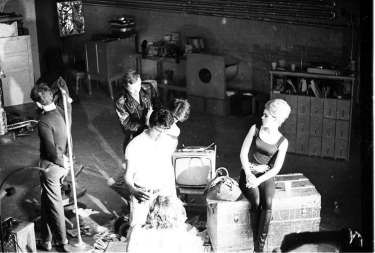
Sitting on the Silver Trunk, waiting to be famous.
So they all figured that just because they had been with Andy awhile, they were going to be famous?
In a sense they did use Andy. Yes. But they didn’t want that association. It was rarer that either Gerard or Mary would even do this show: Because neither of them had anything to do with Andy for all these years. But Andy lives on. Andy’s legacy, Andy’s fame is getting bigger and bigger. It’s not dying down. I know because I’ve been making his paintings for the last 20 years, so I know how the market goes. One day I couldn’t sell a painting. The next day I get five phone calls from people. So I know how it goes from leap to leap to leap to leap.... and how it’s building. He’s like on game shows now. Who was the Pop Artist? Andy Warhol. He’s mentioned everywhere.
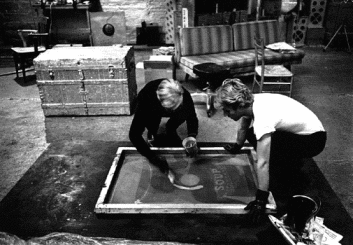
Silk Screening, "Making Andy's Art".
Tell me about "Making Andy's Art".
I was happy to be a part of that. Because I was in the most significant part of it. Now I’m in the real significant part of it of keeping his art out. People can purchase the paintings. They can own them. That’s what he really wanted. That’s what he told me many times. He was reading the paper one day, and he says, “Oh no, oh no, I don’t understand it Louis. Why are they buying these fake.... The Spanish painter. Dali’s. My God, there’s something like 20,000 of them out there. They’re buying them up at these prices”. I said, You don’t like it? ” “Oh, no I like it. That’s great . That's a compliment when somebody makes someone else’s art.” He had even named in his books the way to make his art. Step by step. How to make his silk-screen art. That’s all I did.
Well you learned how to do it?
I learned how to do it. I learned how to do it but I’ve learned a lot more since then. Because the ones I make are much better than the ones he made. Now, later on when he started doing prints, and had that printer, that great printer that lived down in the basement. They were making all these prints, it’s the80’s.He made perfect paintings. But Andy’s are overlapping and there are little pieces missing. I know, because I know what happened. I know, because when I’m using the screen it happens to me.

Marilyn Monroe (Studio Promo Photo) copyright Bettman/Corbis
How do you make an Andy Warhol painting?
Here’s how you do it. You get the photograph, of the subject. If it’s Marilyn or whatever. You take it in and have a copy made on a negative.

The Negative
Then you take the reverse negative down and you have it put on a screen, a silk screen. They burn it in and you’ve got it. You drop any color and you have the perfect image. And then the background, you have to paint the background. Like the Marilyn there. Paint the eyelid. Hand me that there and I’ll show it to you. It’s like this. The black is the image. The ink is the image. The eyes, the eyebrows, the hair... that’s the image. You make a round oval place like that and then you paint it flesh color...then you paint it with the eyelids. You paint the eyes blue in there... you paint that blue. Then you paint the lips. You make the lips. You paint the lips. Then you paint the collar and you paint the background orange.

Andy Warhol's "Marylin"
The you screen over it. and you’ve got it. It’s a print. It’s a printing form. So, it’s like very simple to do. Anybody can do it. But, if they catch you they make you stop.
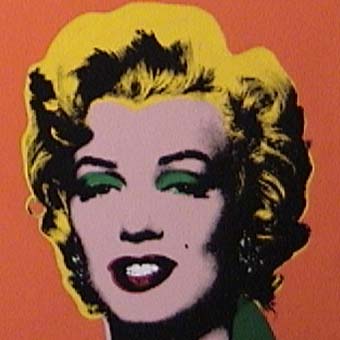
Louis Waldon's "Marylin"
Why, did they make you stop?
Because if you start making them and selling them. I sign them and stamp them with my name on them so that...... I’ve had one go for almost a million dollars! These people had a Brando that I made and they sold it to this Swiss German who was a big collector for an Arab. He had one of the biggest estates in Switzerland and had a big collection going, and they sold it for $1,000,000 to this Arab. They wanted to get it with some history behind it so they put it in a big, he was making an Andy Warhol catalogue book, and he put it in there so it would be an authentic Warhol.
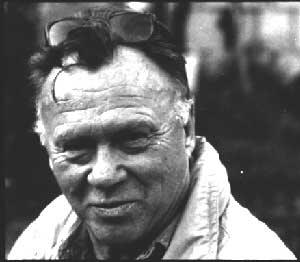
Louis Waldon, Artist 2002
I got $60,000 I think after I threatened them. I told the German guy who owned the painting, the reason you bought it from me for 250 bucks! I said, listen, I’m going to explain something to you because you’re German. You don’t know this, but in America when you rob the bank everybody splits except the guy who came up with the idea and he gets a little bit more. So, you got 250,000 dollars, I want at least 100,000. He gave me 60, maybe 70.
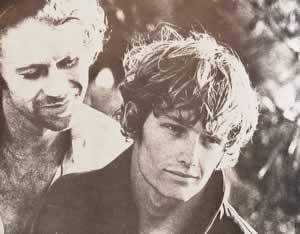
Louis Waldon, Actor
Amazing.... then the picture wound up in the catalogue and?
It was never accepted. The guy died of aids. So the whole thing is up in the air. They made the book but they didn’t.... the painting is still sitting in that Arab’s library.
So it’s like really a tribute to Andy?
Absolutely. Absolute tribute to Andy. I do it because I’m not really an artist. I was never a painter. I can’t draw or anything like that. But I’ve got a good eye for color. I have a good eye for printing, and this is what this is all about, printing. All you need is a photograph. You form it into a negative, then you put it on a silk-screen and screen it. It’s a simple process. I’ve got this girl now, Joan who was my assistant. She does it all now. She did this whole show. Except ten paintings that I gave that I had from a long time ago.
What kind of pictures do you use? Faces?
Like Liz Taylor .... You get the Liz Taylor photograph, or Marilyn’s photograph, or Brandon’s photograph. You can buy those photographs anywhere where they have those Hollywood things. They are the same ones that Andy used.

Gerard cleaning Factory screens.
Where did Andy get the idea to do this?
Malanga, Gerard came up with this idea. He never did explain it to me. But I know what happened because it’s a fever. It’s so easy to do and you make so many of them that you have to have another project right away. That’s why he got them doing those Polaroid’s. Those portraits, that’s why he did that. Because it’s so simple to do. It was so easy to do. But, you had to have that convincing...”This is art” “This is it.” Even if the mouths would be way over here...the lips... and the eyes would be all crooked. This is it. Because if you are an artist and you create that thing, that’s Art. No matter how it comes out. No wadding them up and doing fifty of them before you get the right one you want. Every one you make is art. That’s a Duchampian thing. So, that was the fun part about it. There was no missing. There was no, it was all good. Up. Yeah, this is really good! Look at this one. This one is really good. ya!ya! oh ya! Think so? Go to Andy, and that’s the best one made....now look at that. And it was true.
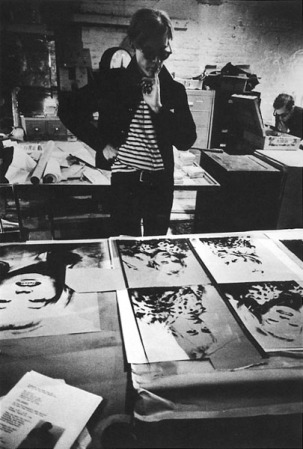
Decisions, decisions.
Andy did a lot of these things?
Absolutely. I had nothing to do with that. But they stole everything. I basically came up with...a little thief came to me with three of the artist’s screens that he said he got from the Factory. He was an artist and he came out of San Diego. They deny that he took those screens. But I, that’s how I first got started. He came to me with the screens. He knew how to screen and I knew how to screen. We got together and started making them. We made Brando’s. I can’t remember his name. He died of aids.
So he wound up with these screens?
That’s what he said. He came to me with them .He’d been at the Factory. I knew that. He came with the San Diego group. All those other painters. We picked them up at a school down there in Santa Barbara, when we were down there doing “Surf’s Up”. Andy was traveling around at that time doing universities. Talking and showing his movies. Viva would talk and Alan Midgette played him in Oregon. They caught up with him there.
Tell me about that.
I can’t really remember what happened. He was at out there in Oregon with someone that had known Andy. Saw Alan up close and said, “You’re not Andy Warhol.” Starting yelling really loud in the audience. That’s not Andy Warhol. That’s a fake! Alan just backed off and kept quiet. But Alan could talk. He could imitate. He’s an actor. He’s a good actor too. He could imitate Andy really well. He could do him really well. He looked like him, but much better looking. He has a great face. He made Andy look really good. In fact, I’d love for him to come out if I did a show. I’d love for him to come out and play Andy at the show.

Allan Midgette on the college circuit, pretending to be Andy.
Just off hand, Andy was a pretty funny guy and we’d get into situations like... He would get out of the situation without giving up too much. We got stopped in San Diego by the cops and there were five of us in a station wagon. They got us all out and had us spread-eagled... then they searched us. They were going to ask us what we were doing there and blablabla......They came to Andy and Andy wouldn’t get out of the car. You know something; they didn’t make him get out of the car. He changed the whole thing... all the questioning around into just yes/no. Yes. No. He did it beautifully. “Ohhhhh, no. Oh, Ohhh. Yes. They’d ask him questions. What are you doing here? Are you making a movie? Are you doing this, are you doing...He just went through the whole thing without giving out any information. Just saying yes and no. It was brilliant.
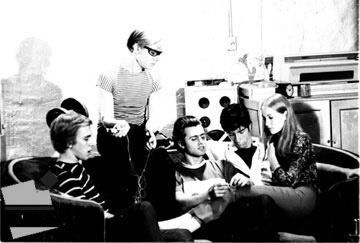
Silver days.
He was a really bright guy...?
Extremely bright and very kind and gentle. Got stern when it comes down to it, but you couldn’t push him around. (He was always in control?)
He was a workaholic. Total workaholic. He worked all the time. He slept from about five in the morning until 9:30-10. He’d get up and come to the Factory about noon. He’d be in the Factory all that time, go to the clubs. The girls used to call him all the time. That was a great thing. You couldn’t get Andy on his phone because it was always busy. As soon as he got home he’d or they would call, telling him stories...gossip. He loved gossip. About this person, about that person. He was excellent.

Just hanging out. Waiting for something to happen. Waiting to be famous.
What would it take to create another Factory in today’s world?
I was asked about that by Don, this millionaire guy who supported me. He bought me a boat, and bought a bunch of paintings from me, and kind of pushed me into it. He was totally fascinated that Andy got everybody to work for nothing. I’m not saying nothing, because there were all these trade offs. And later, this is like the Silver Factory that everybody worked for nothing. Billy Name, everybody. They lived there, and they just hung out. If they could get some money together they would eat there.
It was like a club. That, I don’t think, could never happen again, everybody’s so greedy now, as you are probably finding out. Everybody wants so much Goddamn much money now. Everybody. I couldn’t get anyone to do anything. Don kept saying, but get those people to work for you for nothing. People don’t move anymore for nothing. Even out of college. When you first got out of college you always had to do that apprenticeship. Back in the fifties you always had to do an apprenticeship somewhere. You had to go to work for nothing, or work your way into a situation. Andy took it to an extreme. He traded, and he found a lot of people who were willing to work like that. It gave them independence. It didn’t make them feel that they had to be there or that they had to do it, but they were there.
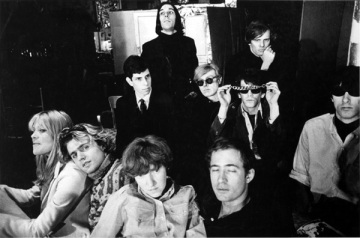
Making a "Factory" work.
What about the difference of time?
I think if you’re working in an area, like Andy, which was the future, creating a situation, you pretty much can. As they were doing now, like if you’re in aerospace, or you are working in something that is very, very different...that a person wants to learn, they probably would do it. But you still have to have that initial amount of money to have a studio. Have a place for people to congregate...to come to. You still have to have that.
Without that, you will never get anybody. That’s essential. That’s the finance...that’s expensive part now.
I’m hanging out with John Chamberlain’s son Angus. He’s a brilliant sculptor. As good as his dad...But he can’t do it. He’s working as a contractor. Does beautiful work on homes. He was up in Topanga Canyon working for a guy that has a glass house. He’s really doing it. He’s totally frustrated because he want so bad to get back to making things with his hands. But, he has to make a living. Even though his dad has all this money he doesn’t have any. He’s fifty years old now. All those old European artists... who have their sons working with them. It’s an incredible situation. The art scene is very bizarre you know.

Making work for the "Factory".
Everybody wants to be famous. That was the thing about that period. There were no Art Stars. They were just starting to be art stars. There were famous people, like Frank Stella, Larry Koons, these are very famous young people that were working and making money at that time...in their lifetime. Making good money. Established there in New York. But now, everybody wants to be an Art Star. Some of them are. There’s this kid over here who’s a sculptor. He gets a fortune for his sculptures. He came out of art school maybe six years ago. Now he’s one of the most famous artists around. He makes a lot of money. Certain people are very gifted and very business wise...business smart.
Back to the Silver Factory?
Ya! It was needed and wanted. People wanted it. A lot of people were living on the streets. A lot of people were living in people’s apartments which were very cheap then.
Still a lot of people were drifting around. They couldn’t keep it together enough to do that and wanted to be famous....wanted to be part of a scene. It just came to him because he was available. He was available as much as they were available. He had already had a history in commercial art. He knew what business was. He made a lot of money. That is there. He knew the people. Andy was a pretty rare guy. He paid for it though. It wasn’t a happy life.
How did he pay for it?
They took his life. They killed him as sure as Robert Kennedy died assassinated......then he gets assassinated. He gets shot. He was under this torture all of the time. As a homophobic. He didn’t want to be known as a homosexual because his mother was so religious....Catholic...So he had to hide that. He couldn’t let it out that he was gay. He came out later.....Like later, in the 80’s after his mother was dead. Bless her heart. She was the artist. She taught him how to draw...took care of him. He had a great sense of humor too. He loved things, Andy did. But most of all he wanted to be a movie star. He wanted to be a big star most of all. He was working towards it. He’d done some TV.
He’d done Love Boat. HAhaHAhaHa!
Anything else you want to say?
